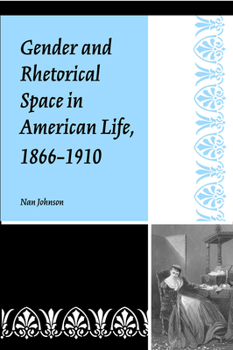Gender and Rhetorical Space in American Life, 1866-1910
(Part of the Studies in Rhetorics and Feminisms Series)
Nan Johnson demonstrates that after the Civil War, nonacademic or "parlor" traditions of rhetorical performance helped to sustain the icon of the white middle class woman as queen of her domestic sphere by promoting a code of rhetorical behavior for women that required the performance of conventional femininity. Through a lucid examination of the boundaries of that gendered rhetorical space--and the debate about who should occupy that space--Johnson...
Format:Paperback
Language:English
ISBN:0809324261
ISBN13:9780809324262
Release Date:March 2002
Publisher:Southern Illinois University Press
Length:240 Pages
Weight:0.75 lbs.
Dimensions:0.5" x 6.4" x 8.7"
Customer Reviews
0 rating





